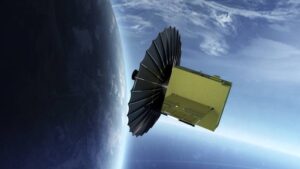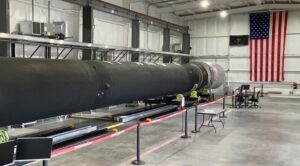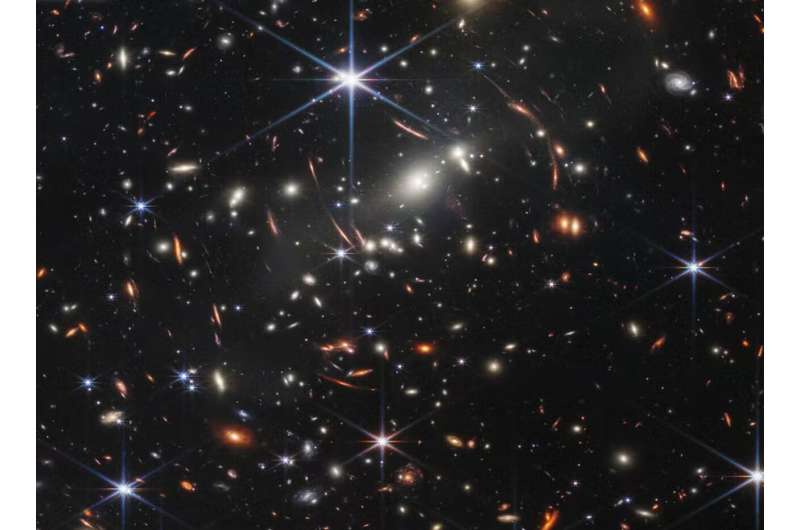SKYNET 6A satellite passes Critical Design Review
Monday, 18 July 2022 09:58 Airbus has achieved a key milestone with the successful completion of the Critical Design Review (CDR) of the UK Ministry of Defence's (MOD) next secure military communications satellite, SKYNET 6A.
Richard Franklin, Managing Director of Airbus Defence and Space UK said: "Achieving this crucial milestone is tangible proof that in partnership with Defence Digital in the Ministry of Defence
Airbus has achieved a key milestone with the successful completion of the Critical Design Review (CDR) of the UK Ministry of Defence's (MOD) next secure military communications satellite, SKYNET 6A.
Richard Franklin, Managing Director of Airbus Defence and Space UK said: "Achieving this crucial milestone is tangible proof that in partnership with Defence Digital in the Ministry of Defence Rocket Lab supports significant milestone for DARPA and SDA for Mandrake-2 Mission
Monday, 18 July 2022 09:58 Rocket Lab USA, Inc. (Nasdaq: RKLB) has supported a significant milestone for Defense Advanced Research Projects Agency (DARPA) and the Space Development Agency's (SDA) Mandrake-2 mission.
In June, the two Mandrake-2 spacecraft, Able and Baker, successfully demonstrated closing and maintaining an optical communications link for the full test duration of 40 minutes at a range of 114 km. In
Rocket Lab USA, Inc. (Nasdaq: RKLB) has supported a significant milestone for Defense Advanced Research Projects Agency (DARPA) and the Space Development Agency's (SDA) Mandrake-2 mission.
In June, the two Mandrake-2 spacecraft, Able and Baker, successfully demonstrated closing and maintaining an optical communications link for the full test duration of 40 minutes at a range of 114 km. In Rocket Lab launches first of 2 Responsive Space Missions for NRO
Monday, 18 July 2022 09:58 Rocket Lab USA, Inc (Nasdaq: RKLB) has launched the first of two responsive space missions for the National Reconnaissance Office (NRO). Following lift-off of NROL-162 ("Wise One Looks Ahead") from Pad A at Rocket Lab Launch Complex 1 at 06:30 UTC, July 13, 2022, Electron successfully delivered the NRO's national security payload to space.
In partnership with the Australian Department of D
Rocket Lab USA, Inc (Nasdaq: RKLB) has launched the first of two responsive space missions for the National Reconnaissance Office (NRO). Following lift-off of NROL-162 ("Wise One Looks Ahead") from Pad A at Rocket Lab Launch Complex 1 at 06:30 UTC, July 13, 2022, Electron successfully delivered the NRO's national security payload to space.
In partnership with the Australian Department of D Third Tianlian II-series satellite launched
Monday, 18 July 2022 09:58 China launched a Tianlian II-series satellite early on Wednesday morning to form a global network of the country's second-generation relay satellites.
A Long March 3B carrier rocket blasted off at 12:29 am from the Xichang Satellite Launch Center in southwestern China's Sichuan province and then placed the Tianlian II-03 satellite into a geostationary orbit, according to China Aerospace Sc
China launched a Tianlian II-series satellite early on Wednesday morning to form a global network of the country's second-generation relay satellites.
A Long March 3B carrier rocket blasted off at 12:29 am from the Xichang Satellite Launch Center in southwestern China's Sichuan province and then placed the Tianlian II-03 satellite into a geostationary orbit, according to China Aerospace Sc UAE announces plans for radar satellite constellation and space fund
Monday, 18 July 2022 09:54
The United Arab Emirates will develop a radar satellite constellation as part of a new fund worth more than $800 million to support the country’s space sector.
The post UAE announces plans for radar satellite constellation and space fund appeared first on SpaceNews.
Op-ed | Don’t Let Recession Fears Threaten Space Sustainability Gains
Monday, 18 July 2022 04:43
The space industry must think long term, unify around big problems and tap into defense as key funding partner
The post Op-ed | Don’t Let Recession Fears Threaten Space Sustainability Gains appeared first on SpaceNews.
Firefly gears up for second Alpha launch
Sunday, 17 July 2022 22:06
Firefly Aerospace is preparing for the second launch of its Alpha rocket in late August or early September, hoping that a successful mission can enable a “step change” in activity for the company.
First image from NASA's James Webb Space Telescope reveals thousands of galaxies in stunning detail
Sunday, 17 July 2022 13:50
Billions of years ago, long before a swirling cloud of gas and dust coalesced to form the sun, light left the earliest stars and began a long journey through space.
The light has been traveling ever since, covering trillions upon trillions of miles. It hurtled by galaxies and their nascent stars, some of which were accompanied by planets. And on one of these, a species evolved with the ability not only to question what might be out there, but to build tools to see what its own eyes could not.
On Monday, the world got its first glimpse of that ancient light courtesy of NASA's James Webb Space Telescope, the most sophisticated and ambitious deep-space viewing tool yet assembled.
It's a snapshot of deep space, the light from innumerable galaxies swirling around a central point like the light thrown off from a disco ball. Flanked by President Joe Biden and Vice President Kamala Harris, NASA Administrator Bill Nelson unveiled the image at a White House news conference.
NASA, Northrop Grumman to test fire future Artemis booster motor
Saturday, 16 July 2022 23:50 NASA and Northrop Grumman will perform a full-scale static test of a Space Launch System (SLS) solid rocket booster motor at Northrop Grumman's Promontory, Utah, test facility July 21. Engineers will fire the booster during the demonstration, called the Flight Support Booster 2 test, to evaluate materials and processes to improve boosters for future Artemis missions.
"The current SLS boost
NASA and Northrop Grumman will perform a full-scale static test of a Space Launch System (SLS) solid rocket booster motor at Northrop Grumman's Promontory, Utah, test facility July 21. Engineers will fire the booster during the demonstration, called the Flight Support Booster 2 test, to evaluate materials and processes to improve boosters for future Artemis missions.
"The current SLS boost Dragon docks at ISS to deliver various science payloads
Saturday, 16 July 2022 23:50 While the International Space Station was traveling more than 267 miles over the South Atlantic Ocean, the SpaceX Dragon cargo spacecraft autonomously docked to the forward-facing port of the station's Harmony module at 11:21 a.m. EDT Jul 17, with NASA astronauts Bob Hines and Jessica Watkins monitoring operations from the station.
The Dragon launched on SpaceX's 25th contracted commercial
While the International Space Station was traveling more than 267 miles over the South Atlantic Ocean, the SpaceX Dragon cargo spacecraft autonomously docked to the forward-facing port of the station's Harmony module at 11:21 a.m. EDT Jul 17, with NASA astronauts Bob Hines and Jessica Watkins monitoring operations from the station.
The Dragon launched on SpaceX's 25th contracted commercial Ingenuity Postpones Flights Until August
Saturday, 16 July 2022 23:50 It's now dust season and winter on Mars, meaning there's more dust in the air and less sunlight to help recharge Ingenuity's batteries. Dust levels are expected to subside later in July, so the team has decided to give the helicopter's batteries a break for a few weeks and build their daily state of charge back up. Weather permitting, Ingenuity is expected to be back in the air around the start
It's now dust season and winter on Mars, meaning there's more dust in the air and less sunlight to help recharge Ingenuity's batteries. Dust levels are expected to subside later in July, so the team has decided to give the helicopter's batteries a break for a few weeks and build their daily state of charge back up. Weather permitting, Ingenuity is expected to be back in the air around the start A Rover-Sized Boulder Sols 3532-3533
Saturday, 16 July 2022 23:50 Curiosity is back on the road, but some interesting boulders caught our attention and led to a short detour. The team was already planning to divert to the southwest to get some imaging of nearby cliffs, but the large boulders that have tumbled down provide a tantalizing glimpse of what's to come.
Boulders like the large one shown in the above Navcam image (now named "Ilha Novo Destino") c
Curiosity is back on the road, but some interesting boulders caught our attention and led to a short detour. The team was already planning to divert to the southwest to get some imaging of nearby cliffs, but the large boulders that have tumbled down provide a tantalizing glimpse of what's to come.
Boulders like the large one shown in the above Navcam image (now named "Ilha Novo Destino") c Rocking shadows in protoplanetary discs
Saturday, 16 July 2022 23:50 Astronomers from the University of Warwick reveal a new phenomenon dubbed the "rocking shadow" effect that describes how discs in forming planetary systems are oriented, and how they move around their host star. The effect also gives clues as to how they might evolve with time. Dr Rebecca Nealon presented the new work this week at the 2022 National Astronomy Meeting at the University of Warwick.
Astronomers from the University of Warwick reveal a new phenomenon dubbed the "rocking shadow" effect that describes how discs in forming planetary systems are oriented, and how they move around their host star. The effect also gives clues as to how they might evolve with time. Dr Rebecca Nealon presented the new work this week at the 2022 National Astronomy Meeting at the University of Warwick. Cyborg collaboration finds 40,000 ring galaxies
Saturday, 16 July 2022 23:50 Human and machine intelligence worked together to find 40,000 ring galaxies, scientists at the National Astronomy Meeting will announce this week. Dr Mike Walmsley of the University of Manchester and the Galaxy Zoo collaboration will present the new work, describing how this "cyborg" approach measured the shapes of millions of galaxies.
Galaxies live a chaotic life. Collisions with other g
Human and machine intelligence worked together to find 40,000 ring galaxies, scientists at the National Astronomy Meeting will announce this week. Dr Mike Walmsley of the University of Manchester and the Galaxy Zoo collaboration will present the new work, describing how this "cyborg" approach measured the shapes of millions of galaxies.
Galaxies live a chaotic life. Collisions with other g Neutrino Factories in Deep Outer Space
Saturday, 16 July 2022 23:50 The Earth's atmosphere is continuously bombarded by cosmic rays. These consist of electrically charged particles of energies up to 1020 electron volts. That is a million times more than the energy achieved in the world's most powerful particle accelerator, the Large Hadron Collider near Geneva.
The extremely energetic particles come from deep outer space, they have travelled billions of li
The Earth's atmosphere is continuously bombarded by cosmic rays. These consist of electrically charged particles of energies up to 1020 electron volts. That is a million times more than the energy achieved in the world's most powerful particle accelerator, the Large Hadron Collider near Geneva.
The extremely energetic particles come from deep outer space, they have travelled billions of li 
